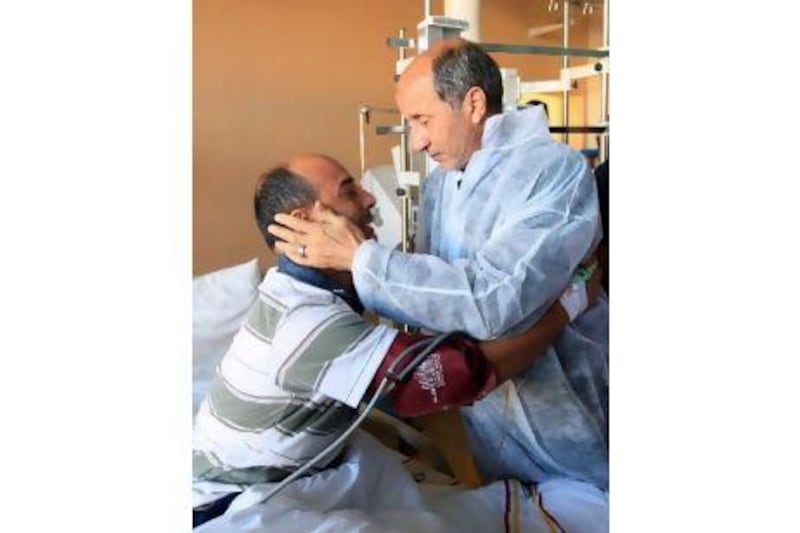Libya's new leaders are expected to declare their country's liberation today. The move would start the clock for elections after months of bloodshed that culminated in the death of the longtime dictator Muammar Qaddafi.
The transitional leadership has said it would declare a new interim government within a month of liberation and hold elections for a constitutional assembly within eight months. A parliamentary and presidential vote would be organised within a year after that. Mahmoud Jibril, the acting prime minister, has said he plans to resign after the declaration of liberation. Yesterday, at the World Economic Forum's annual regional meeting in Jordan, he said the interim government "should last until the first presidential elections."
"The first election should take place within a period of eight months, maximum, to constitute a national congress of Libya," Mr Jibril said. "This national congress would have two tasks, draft a constitution on which we would have a referendum, and the second to form an interim government."
Removing weapons from the streets, establishing law and order and uniting the disparate factions of the National Transitional Council (NTC) were the priorities following Qaddafi's death, he said.
The victory over Qaddafi, however, has been clouded by questions over how former leader was killed after images emerged showing he was found alive and taunted and beaten by his captors during the final moments of the liberation of his hometown in Sirte on Friday.
Yesterday, the interim government was under pressure to hold a burial quickly and in accordance with Islamic traditions.
"A decision has been made to bury him in a secret location," said Mohammed El Fteisi, the head imam of Tripoli's main mosque, now called Martyrs' Mosque. "We have to do this quickly, like the US did with Osama bin Laden, because there are many people who would like to rip him to pieces ... It's time to move on and open a new chapter."
Mr El Fteisi said the delay in burying Qaddafi - longer than religious edicts requiring a burial within 24 hours of death - could be excused because of the great evils he had done to his own people.
"He treated his own people like they were nothing," Mr El Fteisi said. "But we will bury him in the correct way."
Qaddafi's body has been put on display in a commercial freezer at a shopping centre in Misurata as Libyan authorities argued about where to bury the remains. Fighters from Misurata - a city brutally besieged by Qaddafi's forces during the civil war - seemed to claim ownership of it, forcing the delay of a planned burial on Friday.
The fear in Libya is that the debate over the future of the country will be as contentious as the issues surrounding the circumstances of the 69-year-old's death.
The NTC said Qaddafi was in an ambulance headed for Misurata when he died in crossfire between NTC fighters and Qaddafi loyalists. Other accounts say he was fighters from Misurata executed him.
Fathi Bashagha, a spokesman for the Misurata military council, yesterday ruled out a full autopsy unless demanded by an international committee or the transitional government "and so far there have been no requests". At least four groups of doctors have examined the body and determined the cause of death was a bullet to the head and stomach, Mr Bashagha said. "As far as we are concerned in Misurata, doctors have checked him and determined how he died, so there is no need to cut his body up," he said. Some of the most vicious and destructive battles of the revolution took place in Misurata, which Qaddafi brigades had stormed in an onslaught that lasted weeks and saw hundreds of civilians killed. The fighters became some of the fiercest in the ensuing liberation of Tripoli, Bani Walid and Sirte, but their leaders also began flexing their political muscles. Commanders from the city said that Misurata deserved a greater role in the interim government and more funding because of its suffering and subsequent valour. Some also publicly opposed members of the NTC.
"Misurata deserved to capture him," said Abdel Naeem Fattah, a fighter on a victory tour of the capital yesterday. "Our fighters are the best."
Members of Qaddafi's tribe, the Qadhafa, asked for international pressure on the NTC to hand over his body for a proper burial in Sirte. The tribe made the demand in a statement broadcast on Al Rai television in Syria, where many of the family's messages have been broadcast since the liberation of Tripoli.
bhope@thenational.ae
* With additional reporting by Associated Press and Agence-France Presse






